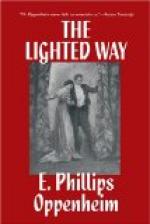There was a simple directness about his speech which seemed to open the subject so naturally that Ruth found herself talking without effort of her accident, and the trouble it had brought. They drifted so easily into conversation that Arnold left them almost at once. He had only a little distance to go before he found Fenella returning. She was carrying a great handful of roses which she had just gathered, and to his relief there was no expression of displeasure in her face. Perhaps, though, he reflected with a sinking heart, she had understood!
“Your brother has just arrived,” he announced. “I think that he has motored down from London. He wished me to let you know that he was here.”
“Where is he?” she asked.
“He is on the lawn, talking to Miss Lalonde,” Arnold replied.
“I will go to them presently,” she said. “In the meantime, you are to make yourself useful, if you please,” she added, holding out the roses. “Take these into the house, will you, and give them to one of the women.”
He took them from her.
“With pleasure! And then, if you will excuse us,—”
“I excuse no word which is spoken concerning your departure,” she declared. “To-night I give a little fete. We change our dinner into what you call supper, and we will have the dining table moved out under the trees there. You and your little friend must stop, and afterwards my brother will take you back to London in his car, or I will send you up in my own.”
“You are too kind,” Arnold answered. “I am afraid—”
“You are to be afraid of nothing,” she interrupted, mockingly. “Is that not just what I have been preaching to you? You have too many fears for your height, my friend.”
“We will put it another way, then. I was thinking of Miss Lalonde. She is not strong, and I think it is time we were leaving. If you could send us so far as the railway station—”
“There are no trains that leave here,” she asserted; “at least, I never heard of them. I shall go and talk to her myself. We shall see. No, on second thoughts, she is too interested. You and I will walk to the house together. That is one thing,” she continued, “which I envy my brother, which makes me admire him so much. I think he is the most charmingly sympathetic person I ever met. Illness of any sort, or sickness, seems to make a woman of him. I never knew a child or a woman whose interest or sympathy he could not win quickly.”
“It is a wonderful thing to say of any man, that,” Arnold remarked.
“Wonderful?” she repeated. “Why, yes! So far as regards children, at any rate. You know they say—one of the writers in my mother’s country said—that men are attracted by beauty, children by goodness; and women by evil. It is of some such saying that you are thinking. Now I shall leave these flowers in the hall and ring the bell. Tell me, would you like me to show you my books?”




